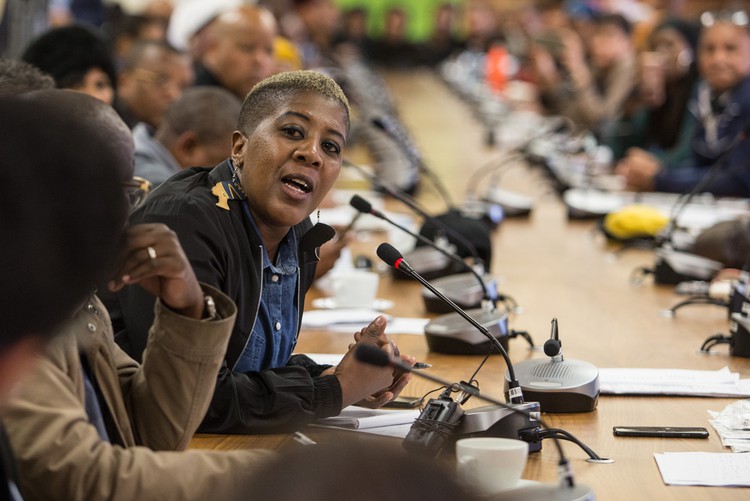Tensions flare at Cape housing dialogue
Gatvol Capetonian has given government 30 days to address some of their demands
About 80 backyarders and homeless people from the metro met at the Castle of Good Hope on Thursday to discuss the lack of housing opportunities for the poor.
The meeting with government officials was hosted by the South African Human Rights Commission (SAHRC), along with representatives from Khayelitsha, Manenberg, Delft, Mitchells Plain and several other areas in the city.
The summit follows weeks after the “shutdown” protests organised by the Gatvol Capetonian group. Traffic around several communities were brought to a standstill in a bid to highlight the need for housing. The aim of the “summit” was to bring government officials and residents around the same table to discuss the crisis.
But the event was marred by several heated verbal altercations during the meeting. Other issues that were raised included water metres, high electricity tariffs, poor sanitation, a lack of access to clean water and long housing beneficiary waiting lists.
A former Steenvilla resident, who requested to remain anonymous, said she was evicted on Tuesday because she could no longer afford to pay her rent. The resident and her two children slept at a friend’s place in the same complex, but were forced to leave. She currently faces charges of trespassing. “I have been pushed around and abused by a system that was supposed to protect me,” she said. The woman called for a moratorium on all evictions.
In June 2018, GroundUp reported the mass eviction of 30 families from the social housing complex.
Neliswa Bomvane, representing backyarders in Thembokwezi, Khayelitsha said people were constantly being evicted. She was one of dozens of people who occupied a set of flats owned by Old Mutual in 2018. She said the flats had been empty for over 15 years.
Bomvane urged government officials to handover vacant land near the flats where, she says, backyarders could built their own houses.
Fadiel Adams of the Gatvol Capetonian group said: “These people are only going to get housing if they take action.” Adams said that they wanted the department of human settlements to present its plan for housing in the province.
Among the demands was a list of which vacant parcels of land belonged to national, provincial or local government. He said the state should get back to them within 30 days. “The time for talking is done,” he said. “We’re here as a courtesy. We don’t expect much.”
Adams said that “in all probability they would shutdown again on a greater scale” if the government failed to address some of their demands.
Representatives from national government and the City of Cape Town were invited to the meeting but only officials from the Western Cape government were in attendance.
Western Cape Minister for Human Settlements Tertius Simmers said the department would be hosting “beneficiary verification registration weekends” in October and November. This will help the department clean up its database and update beneficiary information. Simmers said a task team would be set up to deal with some of the concerns raised by backyarders and shack dwellers.
Midway into discussions, tensions boiled over, leading to outbursts by several residents, who believed that their concerns had not been heard. After calm was restored, Simmers said that he was in the process of visiting each ward to listen to residents’ complaints.
SAHRC commissioner Chris Nissen said he wanted to arrange a more structured dialogue between communities and government.
Outside, Melanie Arendse from Ottery said that she thought the dialogue was a success because they managed to hand over their demands. “It’s not going to be a success if they, themselves, do not take it to heart … We don’t want to shutdown, we want a peaceful process,” she said.
Support independent journalism
Donate using Payfast

Don't miss out on the latest news
We respect your privacy, and promise we won't spam you.
Next: Despatch housing project halted by “political tensions”
Previous: Farmworkers want 67 pesticides banned
© 2019 GroundUp.
This article is licensed under a Creative Commons Attribution-NoDerivatives 4.0 International License.
You may republish this article, so long as you credit the authors and GroundUp, and do not change the text. Please include a link back to the original article.

